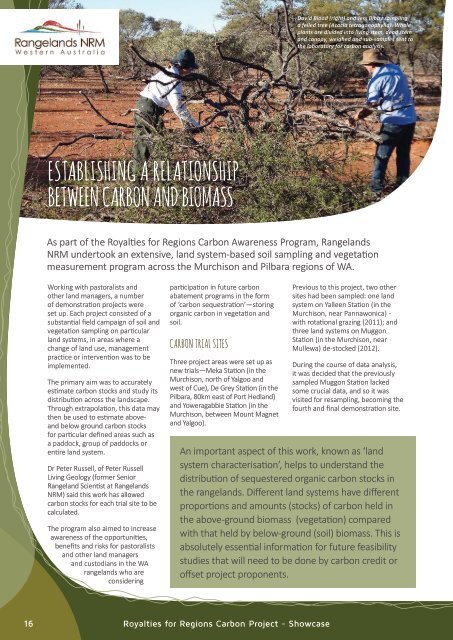Royalties for RegionS Carbon Project - showcase
R4R%20Carbon%20Magazine%20Aug16
R4R%20Carbon%20Magazine%20Aug16
Create successful ePaper yourself
Turn your PDF publications into a flip-book with our unique Google optimized e-Paper software.
David Blood (right) and Jess Bibby sampling<br />
a felled tree (Acacia tetragonophylla). Whole<br />
plants are divided into living stem, dead stem<br />
and canopy, weighed and sub-samples sent to<br />
the laboratory <strong>for</strong> carbon analysis.<br />
Establishing a relationship<br />
between carbon and biomass<br />
As part of the <strong>Royalties</strong> <strong>for</strong> Regions <strong>Carbon</strong> Awareness Program, Rangelands<br />
NRM undertook an extensive, land system-based soil sampling and vegetation<br />
measurement program across the Murchison and Pilbara regions of WA.<br />
Working with pastoralists and<br />
other land managers, a number<br />
of demonstration projects were<br />
set up. Each project consisted of a<br />
substantial field campaign of soil and<br />
vegetation sampling on particular<br />
land systems, in areas where a<br />
change of land use, management<br />
practice or intervention was to be<br />
implemented.<br />
The primary aim was to accurately<br />
estimate carbon stocks and study its<br />
distribution across the landscape.<br />
Through extrapolation, this data may<br />
then be used to estimate aboveand<br />
below ground carbon stocks<br />
<strong>for</strong> particular defined areas such as<br />
a paddock, group of paddocks or<br />
entire land system.<br />
Dr Peter Russell, of Peter Russell<br />
Living Geology (<strong>for</strong>mer Senior<br />
Rangeland Scientist at Rangelands<br />
NRM) said this work has allowed<br />
carbon stocks <strong>for</strong> each trial site to be<br />
calculated.<br />
The program also aimed to increase<br />
awareness of the opportunities,<br />
benefits and risks <strong>for</strong> pastoralists<br />
and other land managers<br />
and custodians in the WA<br />
rangelands who are<br />
considering<br />
participation in future carbon<br />
abatement programs in the <strong>for</strong>m<br />
of ‘carbon sequestration’—storing<br />
organic carbon in vegetation and<br />
soil.<br />
<strong>Carbon</strong> trial sites<br />
Three project areas were set up as<br />
new trials—Meka Station (in the<br />
Murchison, north of Yalgoo and<br />
west of Cue), De Grey Station (in the<br />
Pilbara, 80km east of Port Hedland)<br />
and Yoweragabbie Station (in the<br />
Murchison, between Mount Magnet<br />
and Yalgoo).<br />
Previous to this project, two other<br />
sites had been sampled: one land<br />
system on Yalleen Station (in the<br />
Murchison, near Pannawonica) -<br />
with rotational grazing (2011); and<br />
three land systems on Muggon<br />
Station (in the Murchison, near<br />
Mullewa) de-stocked (2012).<br />
During the course of data analysis,<br />
it was decided that the previously<br />
sampled Muggon Station lacked<br />
some crucial data, and so it was<br />
visited <strong>for</strong> resampling, becoming the<br />
fourth and final demonstration site.<br />
An important aspect of this work, known as ‘land<br />
system characterisation’, helps to understand the<br />
distribution of sequestered organic carbon stocks in<br />
the rangelands. Different land systems have different<br />
proportions and amounts (stocks) of carbon held in<br />
the above-ground biomass (vegetation) compared<br />
with that held by below-ground (soil) biomass. This is<br />
absolutely essential in<strong>for</strong>mation <strong>for</strong> future feasibility<br />
studies that will need to be done by carbon credit or<br />
offset project proponents.<br />
16<br />
<strong>Royalties</strong> <strong>for</strong> Regions <strong>Carbon</strong> <strong>Project</strong> - Showcase


